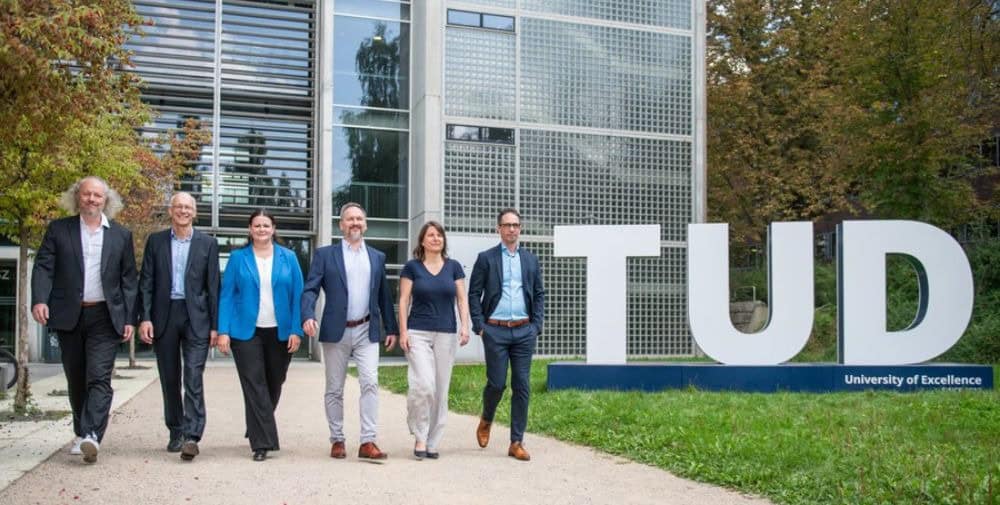
Developing solutions for the pressing issues of the 21st century through cutting-edge research
“TUD is entering the decisive phase of the current round of Clusters of Excellence with great confidence. With the submission of six full proposals, four of them under our sole leadership and two together with our partners at Julius-Maximilians-Universität Würzburg and RWTH Aachen University, we are underlining our performance as a top research institution. With the Clusters of Excellence, we are living up to our claim of developing solutions for the pressing issues of the 21st century through excellent research. Together with the six teams of researchers, many administrative departments of the TUD have contributed to the preparation of the proposals with the utmost commitment. I would like to thank everyone involved for this outstanding team effort,” said TUD Rector Prof. Ursula Staudinger.
“With the three existing Clusters of Excellence, we are addressing important future topics such as the tactile Internet and assistive robotics, novel quantum materials and the physical foundations of life through cutting-edge research. With the initiatives invited for full proposals, we are supplementing and expanding our profile in the field of cutting-edge research to include research into brain functions for machine learning, resource-efficient construction and sustainable high-performance electronics. In this way, we want to make a decisive contribution to gaining knowledge in these highly innovative fields for the benefit of future generations,” adds Prof. Angela Rösen-Wolff, Vice-Rector for Research at TUD.
The full proposals will undergo a highly competitive review process until mid-February 2025. The final decision on funding will be made at the end of May 2025. A total of up to 70 Clusters of Excellence can be funded as part of the current round of the Excellence Strategy. The federal and state governments will provide a total of around 385 million euros annually until 2025 and around 539 million euros annually from 2026.
New applications from TU Dresden:
BiC: Behavior in Context: Brain and Machine Computations of Behavior in Complex and Uncertain Environments
Cluster spokesperson: Prof. Stefan Kiebel
The human brain controls behavior in complex situations reliably and highly efficiently. Despite years of research, AI systems cannot act just as efficiently. The Cluster of Excellence BiC wants to investigate whether recently identified brain mechanisms represent key principles for this efficiency that could be transferred to machine learning and the development of therapies.
CARE: Climate-Neutral and Resource-Efficient Construction (TU Dresden together with RWTH Aachen University)
Cluster spokespersons: Prof. Victor Mechtcherine and Prof. Martin Claßen (RWTH Aachen University)
Conventional concrete and cement account for 80 percent of building materials and are responsible for more than 8 percent of global CO2 emissions during production. The CARE Cluster of Excellence at TU Dresden and RWTH Aachen University wants to use climate-friendly building materials, new construction principles, production technologies and circular economy tools to show ways towards sustainable construction.
REC2: Responsible Electronics in the Climate-Change Era
Cluster spokesperson: Prof. Yana Vaynzof
Electronics offer numerous advantages for our lives, but at the cost of enormous resource and energy consumption and the generation of a lot of electronic waste. The REC² cluster is creating the scientific basis for the electronics of the future: new material platforms, component concepts and integrated systems with which responsible electronics can be realized in an ecologically, economically and socially sustainable way.
Continuation applications from TU Dresden:
CeTI: Centre for Tactile Internet with Human-in-the-Loop
Speaker: Prof. Frank H. P. Fitzek
CeTI promotes efficient collaboration between humans and machines. One application is the co-working of humans and machines with mutual learning and across distances without programming knowledge. This requires the development of new technologies for real-time communication as well as resilient models of the human body and its responsiveness.
ctd.qmat: Complexity, Topology and Dynamics in Quantum Matter (TU Dresden together with Julius-Maximilians-Universität Würzburg)
Speakers: Prof. Matthias Vojta and Prof. Ralph Vojta. Matthias Vojta and Prof. Ralph Claessen (Julius-Maximilians-Universität Würzburg – JMU)
ctd.qmat develops new quantum materials with tailor-made functionalities that form the indispensable basis for technological progress. The cluster, which is supported by the TUD and the University of Würzburg, combines physics, chemistry and materials science and links two of the world’s leading research locations for condensed matter. It builds a bridge between theoretical and experimental basic research with a strong application focus.
PoL: Physics of Life. The Dynamic Organization of Living Matter
Speaker: Prof. Otger Campàs
Understanding life is one of the greatest and most complex scientific challenges. The cluster wants to get to the bottom of the fundamental questions in cell and developmental biology and initiate a paradigm shift in the process: We cannot do without physics to comprehensively understand biological processes.
– – – – –
Further links
👉 www.tu-dresden.de
Photo: Sven Ellger/TUD




